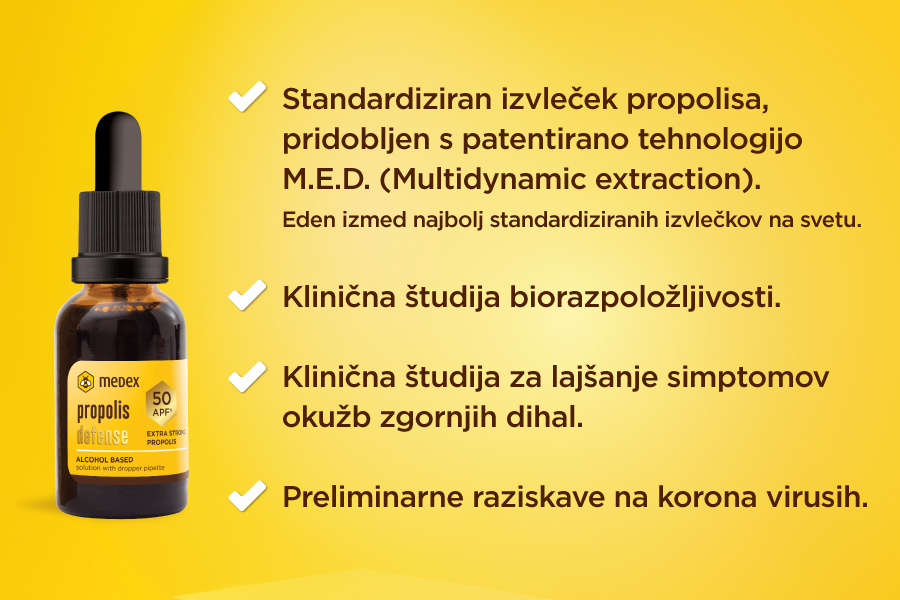Propolis is the most famous bee product, after honey, with wide use in traditional folk medicine as the so-called "natural antibiotic" . Antibiotics work in much higher concentrations, so a direct comparison is of course not entirely appropriate.
However, propolis has a strong enough effect to work antimicrobial and anti-inflammatory, both on the mucous membrane and on the skin. Despite the many beneficial effects for humans, producers of propolis products face two very important challenges. These are:
- appropriate standardization of propolis, which would ensure the repeatable quality and effect of products with propolis,
- and preparation of aqueous solutions of propolis, which is a widely used alternative to alcohol solutions.
At Medex, we have taken both challenges under scrutiny in recent years and developed the Propolis Defense line, which offers a solution to the dilemmas presented. Propolis Defense includes completely alcohol-free solutions of propolis with the key advantage of the classic alcoholic extract: that is high content and concentration of flavonoids, which is comparable to alcoholic extracts. These are the strongest water-based propolis products on the market.
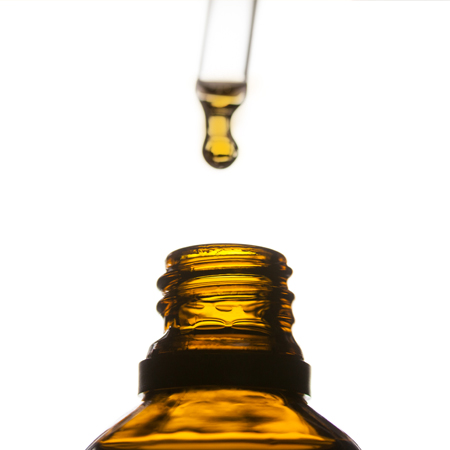
Propolis is composed from more than 200 different chemical substances, which vary greatly depending on the season, location of collection or bee pasture, type of bees and the like. For these reasons, propolis very difficult to standardize well and correlate with reproducible effect. Most propolis products on the market are of uncontrolled quality, as we do not know how it was purified, what the concentration of flavonoids is, and which flavonoids predominate.
Among other things, labels that say propolis is "highly purified" or the percentage of propolis contained in a certain product, for example "contains as much as 20% propolis", can often mislead. For most products, this data is hardly a guarantee of quality and efficiency. The amount of flavonoids in purified propolis is namely, it can different. This is between 20 and 50%. Although it is true that the concentration of flavonoids in unpurified propolis is even lower, the amount of propolis in the product alone is not sufficient information to guarantee the strength or effectiveness of the individual product.
With a new line Propolis Defense we can guarantee a standardized content of bioflavonoids and reproducible effects that have been proven by clinical studies.
2. Challenge: solubility of propolis in water
The eternal problem of researchers in the field of propolis is his poor solubility in water. Propolis is soluble in alcohol, so most tinctures and sprays for oral use are in the form of an alcohol solution. In the case of an infection of the oral cavity, inflamed throat and pharynx, alcohol solutions are unsuitable, as they cause burns of the oral mucosa, and can even further irritate the already inflamed mucosa. Propolis from alcohol solutions precipitates on contact with saliva and can cause staining of tooth enamel with frequent use. It is also not suitable for use by children, pregnant women and other groups of people who cannot or do not want to consume alcohol. An alternative for these groups of people is the use of aqueous extracts, but completely different substances are leached in water than in alcohol and in a much smaller amount, which makes such aqueous preparations insufficiently concentrated to be effective on their own.
Aquatic Propolis Defense has a high content and concentration of flavonoids comparable to alcohol extracts. Therefore, the effects are the same as with alcoholic solutions.
Propolis Defense water solutions of propolis have just triple standardization. We use propolis extract, prepared according to patented process, which is basically hydro-alcoholic. The alcohol is later removed and the dry extract is encapsulated in natural ones carriers. When mixed with water, it thus forms a stable dispersion, partly a solution, without a single drop of alcohol. Therefore, water-based propolis is more suitable for the preparation of solutions for oral hygiene or direct application to the oral mucosa.
The extract is standardized for total flavonoids and additionally for 6 most important flavonoidsfor brown propolis – za rjavi propolis – galangin, pinocembrin, apigenin, chrysin, quercetin and pinobanksin. The entire product is additionally standardized for total flavonoids and marked with APF rate®.
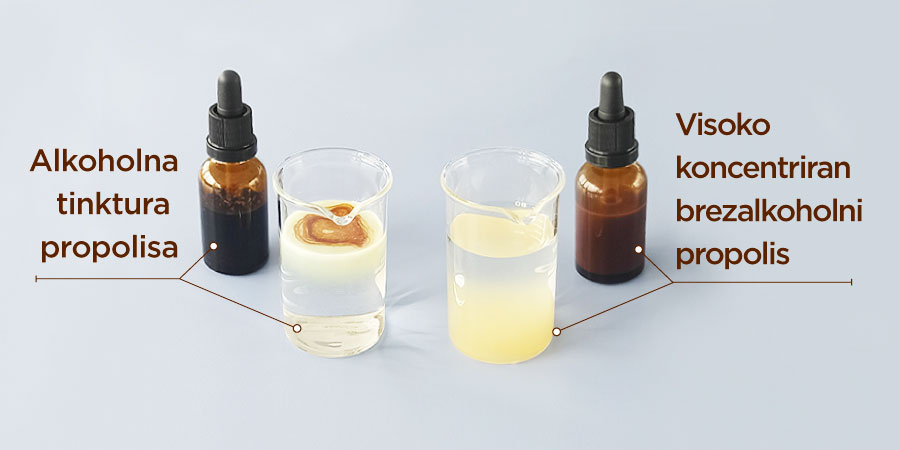
When mixed with water, highly concentrated alcohol-free Propolis Defense forms a stable dispersion. Therefore, water-based propolis is more suitable for the preparation of solutions for oral hygiene or direct application to the oral mucosa.
What is the meaning of APF?
APF = Active Propolis Flavonoids
Active Propolis Flavonoids is a standardization scheme developed at Medex and implemented in our own laboratories using recognized analytical methods. It tells us the concentration of flavonoids from propolis in the product. So APF® 30 for example means that the concentration of flavonoids in the product is at least 30 mg/ml, thus guaranteeing the high quality and repeatable effect of our products.
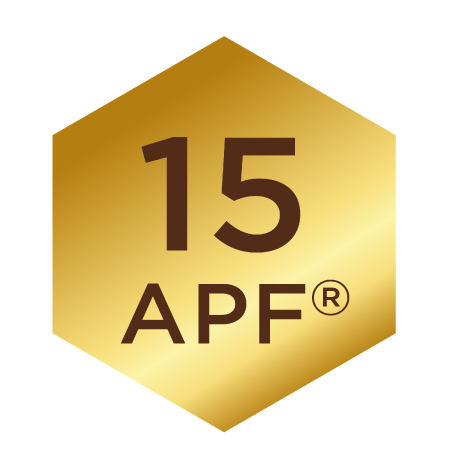
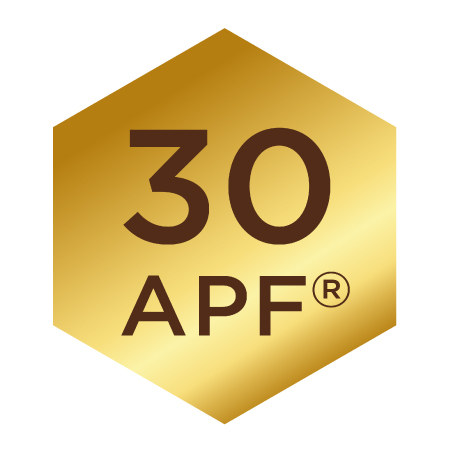
We guarantee that one milliliter of solution contains a minimum of 30 mg of bioflavonoids.
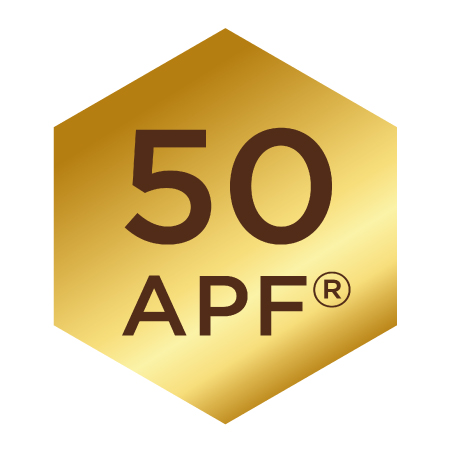
min. bioflavonoids 50 mg/ml
We guarantee that one milliliter of solution contains a minimum of 50 mg of bioflavonoids.
The effectiveness of the daily dose is precisely determined by a clinical study
But what does standardization have to do with product performance itself? Standardization allows precise determination of daily doses, which were recently confirmed by clinical research,1 precisely on the extract that we use in Propolis Defense aqueous solutions of propolis. For the first time in history, a placebo-controlled study confirmed the hitherto presumed healing power of propolis in a case relief of symptoms of upper respiratory tract infections.
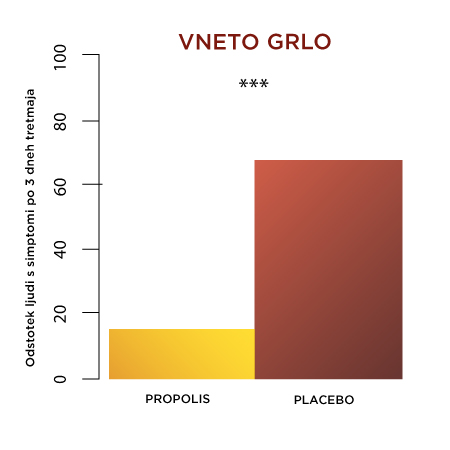
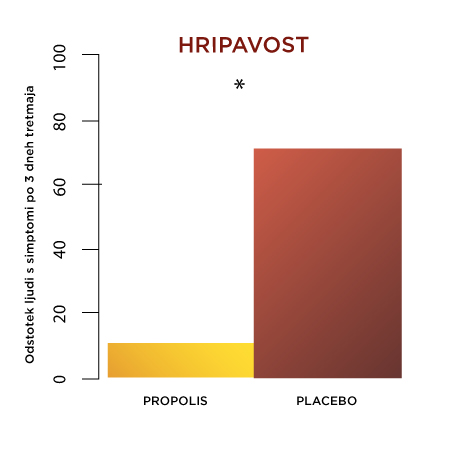
* p<0,05, *** p<0,001
Source: Adapted from Esposito et al., 20211
A clinical study proves that daily application 12-24 mg flavonoids from standardized propolis into the oral cavity with the help of a spray significantly shortens the duration of symptoms, such as sore throat, hoarseness and swelling of the throat. More than 80 % of those who used the spray, after three days he was symptom free, while most people who took the placebo still had symptoms. Duration of symptoms it is in the group with propolis shortened by two days. This is a great and welcome contribution to faster recovery in upper respiratory tract infections.
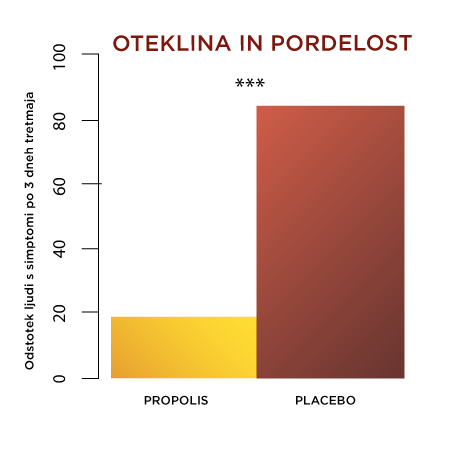
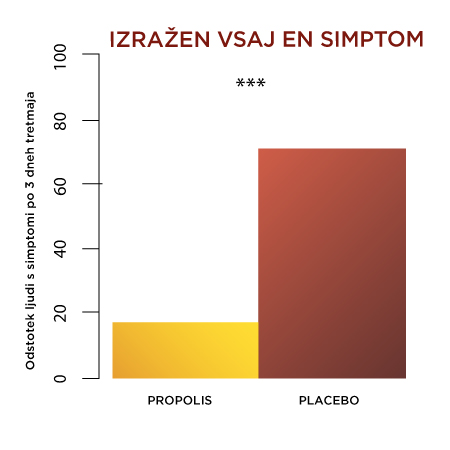
*** p<0,001
Source: Adapted from Esposito et al., 20211
Propolis Defense in tincture, dropper solution and sprays
Propolis Defense water line consists of two oral spray with APF® level 15 and APF® 30 water solution with a dropper for easier dosing.
Oral spray is intended to:
- local action to relieve the symptoms of an upper respiratory tract infection
Dropper solution can be used:
- orally for systemic anti-inflammatory action, in inflammation of the stomach or other gastrointestinal tract
- or to prepare a solution for oral hygiene, which, according to research, helps to inhibit caries2
- and prevention and relief of inflammation of the gums and oral mucosa3.
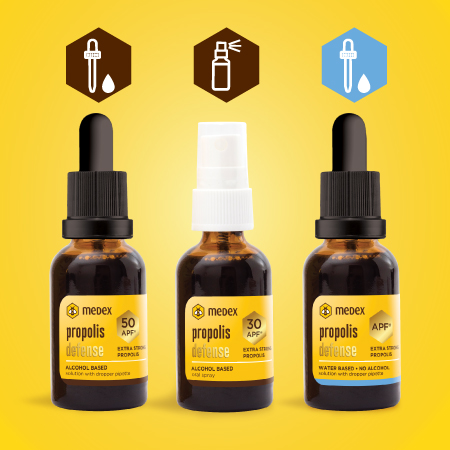
New Propolis Defense line next to the water ones also includes classic alcohol solutions of propolis, but now even stronger, with oral spray level APF® 30 and tincture grade APF® 50.
Want to know more? Ask us!
At Medex, we select the ingredients for our products based on verifiable results and repeatable clinical studies. We are committed to the transparency of the active ingredients used, so we are available for additional questions. We invite you to contact the Head of Development at Medex,dr. Roka Kopinča, on [email protected]. I will answer you as soon as possible.
1. Esposito C, Garzarella EU, Bocchino B, D'Avino M, Caruso G, Buonomo AR, Sacchi R, Galeotti F, Tenore GC, Zaccaria V, Daglia M. A standardized polyphenol mixture extracted from poplar-type propolis for remission of symptoms of uncomplicated upper respiratory tract infection (URTI): A monocentric, randomized, double-blind, placebo-controlled clinical trial. Phytomedicine. 2021 Jan;80:153368. doi: 10.1016/j.phymed.2020.153368. Epub 2020 Oct 8. PMID: 33091857.
2. Dehghani M, Abtahi M, Hasanzadeh N, Farahzad Z, Noori M, Noori M. Effect of Propolis mouthwash on plaque and gingival indices over fixed orthodontic patients. J Clin Exp Dent. 2019;11(3):e244-e249. Published 2019 Mar 1. doi:10.4317/jced.55026
3. Anauate-Netto C, Anido-Anido A, Leegoy HR, et al. Randomized, double-blind, placebo-controlled clinical trial on the effects of propolis and chlorhexidine mouthrinses on gingivitis. Braz Dent Sci. 2014;17(1):11-15. doi:10.14295/bds.2014.v17i1.947
